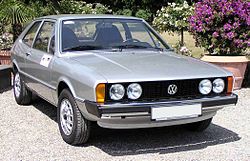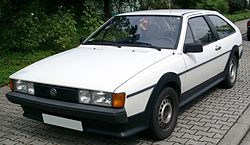Volkswagen Scirocco
 | |
| Manufacturer | Karmann (1974–1992) Volkswagen Group (2008–) |
|---|---|
| Production | 1974–1992 2008–present |
| Predecessor | Volkswagen Karmann Ghia |
| Successor | Volkswagen Corrado (after 1992) |
| Class | Sport compact |
| Body style | 3-door Coupe |
| Layout | FF layout |
The Scirocco is a 3-door Coupe manufactured by German automaker Volkswagen, undergoing two generations of development between 1974 and 1992 and reintroduced in a third generation in August 2008.
Etymology
The Scirocco name derives from the Italian word for the Sirocco wind — and the period in its history when Volkswagen named vehicles after prominent winds, including also Passat (after the German word for Trade wind), Golf (after Gulf Stream), Bora (after Bora), Polo (after Polar Winds), and Jetta (after Jet stream).
Scirocco I (1974–1982)
 | |
| Production | 1974–1982 504,153 produced |
|---|---|
| Assembly | Osnabrück, Germany |
| Platform | Volkswagen Group A1 platform |
| Engine | 1.1 L I4, 1.3 L I4, 1.5 L I4, 1.6 L I4, 1.7 L I4 |
| Transmission | 4-speed manual on early models 5-speed manual on later models 3-speed automatic |
| Wheelbase | 2,400 mm (94.5 in) |
| Length | 3,880 mm (152.8 in) |
| Width | 1,625 mm (64.0 in) |
| Height | 1,310 mm (51.6 in) |
| Related | Volkswagen Rabbit/Golf Volkswagen Jetta |
| Designer | Giorgetto Giugiaro |
Volkswagen began work on the car during the early 1970s as the replacement for the aging Karmann Ghia coupe, and designated it the Typ 53 internally. The platform of theGolf/Rabbit and Jetta was used to underpin the new Scirocco, although almost every part of the car was re-engineered in favour of a sportier drive, and the model's all-new styling, penned by Giorgetto Giugiaro, was sleeker and sportier than that of either the Golf or Jetta. Launched six months before the Golf, in order to resolve any teething troubles before production of the high volume hatchback started, the Scirocco went on sale in Europe in 1974 and in North America in 1975. Mark I models featured a range of four-cylinder engines with displacements from 1.1 to 1.6 L (1.7 L in North America (1975 1.5L (1471), 1976-77 1.6L, 1978 1.5L (1457), 1979-1981 1.6 (1588cc), 1981 1.7 (1715cc) USA models), all featuring a single-overhead camshaft and two valves per cylinder. 1975-1978 model year USA vehicles had 4-speed manual transmissions; for the 1979 model year, USA vehicles had 5-speed manual transmissions. Understandably, automatic transmission-equipped Sciroccos were rare.
The car changed little before being replaced by the Mark 2 version in 1982 (Europe). However, air conditioning became available as an option on the domestic market in August 1975. The possibility to retrofit the installation, together with a larger battery, was offered to existing owners.
During the production of the Mark I, there were subtle changes to the body and trim. In 1977 (1976 was first year), the conventional two wiper system changes to a single wiper which parks on the passenger side of the windscreen. In 1978, the separate front side marker and turn signal, changed to a combination wrap-around orange lens. Other mid-life changes include chrome bumpers with rubberised end caps to a plastic one-piece wrap around bumper. In 1979, the one-pieces "flag" style outside mirrors transitioned to a two-piece shrouded mirror. There were also special variants throughout the Mark I production. Most distinguishable by paint schemes and trim, there were special versions called "Sidewinder", "Sidewinder II", "Champagne Edition", "Champagne Edition II" and the "S". The Champagne Edition II only came in white with black accents. On the NA models the 1980 "S" versions came in only three colours, Alpine White, Black and Mars Red with unique colour accents. This was followed by the 1981 "S" versions which only came in Cosmos Silver Metallic, Cirrus Gray Metallic and Mars Red without the colour accents. Manually retractable sliding steel sunroofs were an available option on the "S" versions, and possibly non-"S" vehicles, too.
Scirocco II (1982–1992)
 | |
| Production | 1982–1992 291,497 produced |
|---|---|
| Assembly | Osnabrück, Germany |
| Platform | Volkswagen Group A1 platform |
| Engine | 1.3 L I4 1.5 L I4 1.6 L I4 1.7 L I4 1.8 L I4 1.8 L DOHC 16-Valve I4 |
| Transmission | 5-speed manual 3-speed automatic |
| Wheelbase | 2,400 mm (94.5 in) |
| Length | 4,210 mm (165.7 in) |
| Width | 1,645 mm (64.8 in) |
| Height | 1,305 mm (51.4 in) |
| Related | Volkswagen Rabbit/Golf Volkswagen Jetta |
A heavily re-designed "Mark 2" variant (internally designated Typ 53B) went on sale in 1982, although it remained on the A1 platform. One unique feature of the Mark 2 was the location of the rear spoiler midway up the glass on the rear hatch. A mid-cycle update occurred in 1984, which included minor changes over the 1982 model: removal of the outlined "SCIROCCO" script from the rear hatch (below the spoiler), a redesigned air conditioning compressor, and a different brake master cylinder with in-line proportioning valves and a brake light switch mounted to the pedal instead of on the master cylinder. Half way through the 1984 model year, a new space-saver spare wheel was added, that provided room for a larger fuel tank (with a second "transfer" fuel pump). Leather interior, power windows and mirrors, air conditioning, and a manual sunroof were options for all years. Engine power and torque steadily increased over the years. The 1984 model year saw the return of two windshield wipers (vice the large single wiper), absent since the 1976 models. 1982 and 1983 models produced 74 hp (55 kW) and 90 ft·lbf (120 N·m) of torque. The engine code was EN. The 1984 models produced 90 hp (67 kW) and 100 ft·lbf (140 N·m) torque, the engine code was JH. In mid-1986, a 16-valve model was released in the United States and Canada, which included a full body skirt, larger rear spoiler, and tear-drop shaped wheel slots to distinguish it from Mark II 8-valve models. The two engines offered were the PL code (with 123 hp (92 kW) and 120 ft·lbf (160 N·m) of torque), and the Europe-only KR code (139 hp (104 kW)), which had no emissions equipment.
Like the first generation Scirocco, the car was assembled on behalf of Volkswagen byKarmann of Osnabrück.
Scirocco sales continued until 1988 in the United States, 1989 in Canada, and 1992 in Germany.
The Scirocco was effectively replaced by the Corrado in the VW line-up, although this had been on sale since 1989 and aimed further upmarket.
Scirocco III (2008–present)
 | |
| Production | 2008–present |
|---|---|
| Assembly | AutoEuropa, Palmela, Portugal |
| Body style | 3-door hatchback |
| Platform | Volkswagen Group A5 (PQ35) platform |
| Engine | 1.4 L TSI 122 PS (90 kW; 120 hp) 1.4 L TSI BlueMotion Technology 122 PS (90 kW; 120 hp) 1.4 L TSI 160 PS (118 kW; 158 hp) 2.0 L TSI 210 PS (154 kW; 207 hp) 2.0 L TDI 140 PS (103 kW; 138 hp) 2.0 L TDI 170 PS (125 kW; 168 hp) |
| Transmission | 6-speed manual 6-speed automatic DSG 7-speed automatic DSG |
| Length | 4,256 mm (167.6 in) |
| Width | 1,810 mm (71.3 in) |
| Height | 1,404 mm (55.3 in) |
| Curb weight | 2,862 lb (1,298 kg) |
| Related | Volkswagen Golf Mk5 SEAT León Mk2 |
Volkswagen officially announced in June 2006 production of a new Scirocco model at theAutoEuropa assembly plant in Palmela, Portugal.
The new model, identified by the internal type numbers 137 or 1K8, is based on the PQ35 platform of the Golf V and was unveiled at the 2008 Geneva Motor Show. It went on sale in summer 2008 in Europe, with sales in other countries beginning early 2009. The German model had a price of €21,750.
The 2008 model of the Scirocco received a 5 star safety rating from EuroNCAP even after the driver test dummy hit its head off the steering wheel because of the airbag "bottoming out". The model tested was a left-hand-drive 3-door hatchback and scored in 4 areas:
- Adult Occupant 87%, 31 points.
- Child Occupant 73%, 36 points.
- Pedestrian 53%, 19 points.
- Safety Assist 71%, 5 points.
IROC concept (2006)
A concept car previewing the then upcoming Scirocco III was unveiled at the 2006 Paris Auto Show. Named IROC, from the middle four letters of "Scirocco", it used a 200-hp TSI engine.
2.0 TSI EA888 (2008)
Uses a IHI K03 water-cooled turbocharger incorporated in exhaust manifold (BorgWarner is used in EA113 2.0 TSI versions)
Scirocco GT24 (2008-)
The Scirocco GT24 is a race car for the 24-hour race at the Nürburgring. It has a 2.0L TSI engine rated 325 PS (239 kW; 321 hp) and 340 N·m (251 lb·ft) @2100rpm, DSG transmission.
The GT24 was unveiled at GTI Meet 2008 inWörthersee.
Scirocco Studie R (2008)
The Studie R is a concept car based on the Scirocco GT24, after Volkswagen had cancelled the production of the Scirocco R32. It has a 2.0L TSI engine rated at 270 PS (199 kW; 266 hp), 6-speed dual clutch transmission, 4-piston brake calipers and a sound-optimized exhaust system with oval, polished tailpipes.
The Studie R was unveiled at the Bologna Motor Show.
Scirocco R (2009-)
The Scirocco R is a production model based on the GT24. Its 2.0L TSI engine is rated 265 PS (195 kW; 261 hp) at 6000rpm and 350 N·m (258 lb·ft) at 2500rpm, large air intake openings in the front bumper, an integrated front spoiler, bi-xenon headlights, larger rear roof edge spoiler, black diffuser, dual exhaust with chrome tailpipes, Talladega 18-in alloy wheels.
UK models went on sale in 2009.
Scirocco 1.4 TSI BlueMotion Technology
The Scirocco BlueMotion Technology has a 1.4L turbo (122PS) engine with the BlueMotion Technology package. This car features a 68Ah battery and reduced emissions because of special tyres and other gearbox specifications
Absence of a North American version
In April 2007, Volkswagen America vice president Adrian Hallmark claimed that Volkswagen preferred not to bring the Scirocco to North America since it could negatively affect GTI sales. It was later stated that the final decision would be made in 2008 by Martin Winterkorn(Volkswagen's CEO), not Volkswagen of America.
In early March 2008 MotorAuthority reported that, due to the increasing gap between the American Dollar and the Euro, the Scirocco would not be made available for American Consumers. "This car would fit the U.S. market but at the current exchange rate we wouldn't make any money." Volkswagen sales and marketing chief Detlef Wittig told Bloomberg reporters.
Engines
| Model | Years | engine type/code | Power@rpm | Torque@rpm | |
|---|---|---|---|---|---|
| Petrol engines | |||||
| 1.4 TSI 122 bhp | 2008- | 1,390 cc (1.39 L; 85 cu in) I4 turbo | 122 PS (90 kW; 120 hp) @5000 | 200 N·m (148 lb·ft) @1500-4000 | |
| 1.4 TSI 122 bhp BlueMotion Technology | 2009- | 1,390 cc (1.39 L; 85 cu in) I4 turbo | 122 PS (90 kW; 120 hp) @5000 | 200 N·m (148 lb·ft) @1500-4000 | |
| 1.4 TSI 160 bhp | 2008- | 1,390 cc (1.39 L; 85 cu in) I4 supercharger + turbo | 160 PS (118 kW; 158 hp) @5800 | 240 N·m (177 lb·ft) @1500-4500 | |
| 2.0 TSI 200-210 bhp | 2008- | 1,984 cc (1.984 L; 121.1 cu in) I4 turbo (EA888 -CCTA/CBFA/CAWB) | 210 PS (154 kW; 207 hp) @5300-6200 | 280 N·m (207 lb·ft) @1700-5000 | |
| Scirocco R/2.0 TSI | 2009- | 1,984 cc (1.984 L; 121.1 cu in) I4 turbo (EA113) | 265 PS (195 kW; 261 hp) @6000 | 350 N·m (258 lb·ft) @2500 | |
| Diesel engines | |||||
| 2.0 TDI CR 140 bhp | 2008- | 1,968 cc (1.968 L; 120.1 cu in) I4 turbo | 140 PS (103 kW; 138 hp) @4000 | 320 N·m (236 lb·ft) @1750-2500 | |
| 2.0 TDI CR 170 bhp | 2009- | 1,968 cc (1.968 L; 120.1 cu in) I4 turbo | 170 PS (125 kW; 168 hp) @4200 | 350 N·m (258 lb·ft) @1750-2500 | |
Transmissions
All models include standard 6-speed manual transmission. The 1.4 TSI (160PS) can optionally be fitted with a 7-speed DSG transmission, while the 2.0 TSI 200, 2.0 TSI 210, R 2.0 TSI 265 and 2.0 TDI are available with a 6-speed DSG transmission.
Motorsports
In the 24 Hours Nürburgring in May 2008, three new Volkswagen Scirocco did very well in the field of over 200, among them many high powered cars, finishing 11th and 15th, with veteran Hans Joachim Stuck driving both cars (and Carlos Sainz the slower one). The direct competitors, two Opel Astra GTC driven by drivers selected from 18,000 hopefuls in a year-long TV covered process, were beaten decisively. In the Scandinavian Touring Car Championship, Fredrik Ekblom drives a Scirocco for the Biogas team. The car is run on biogas and not petrol.




![Validate my RSS feed [Valid RSS]](valid-rss-rogers.png)















































































ไม่มีความคิดเห็น:
แสดงความคิดเห็น